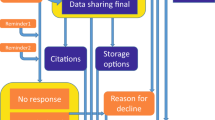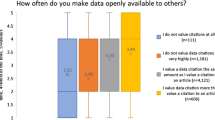Abstract
Advances in science are the combined result of the efforts of a great many scientists, and in many cases, their willingness to share the products of their research. These products include data sets, both small and large, and unique research resources not commercially available, such as cell lines and software programs. The sharing of these resources enhances both the scope and the depth of research, while making more efficient use of time and money. However, sharing is not without costs, many of which are borne by the individual who develops the research resource. Sharing, for example, reduces the uniqueness of the resources available to a scientist, potentially influencing the originator’s perceived productivity and ultimately his or her competitiveness for jobs, promotions, and grants. Nevertheless, for most researchers—particularly those using public funds—sharing is no longer optional but must be considered an obligation to science, the funding agency, and ultimately society at large. Most funding agencies, journals, and professional societies now require a researcher who has published work involving a unique resource to make that resource available to other investigators. Changes could be implemented to mitigate some of the costs. The creator of the resource could explore the possibility of collaborating with those who request it. In addition, institutions that employ and fund researchers could change their policies and practices to make sharing a more attractive and viable option. For example, when evaluating an individual’s productivity, institutions could provide credit for the impact a researcher has had on their field through the provision of their unique resources to other investigators, regardless of whether that impact is reflected in the researcher’s list of publications. In addition, increased funding for the development and maintenance of user-friendly public repositories for data and research resources would also help to reduce barriers to sharing by minimizing the time, effort, and funding needed by individual investigators to comply with requests for their unique resource. Indeed, sharing is an imperative, but it is also essential to find ways to protect for both the original owner of the resource and those wishing to share it.
Similar content being viewed by others
References
Addiction (2007). Guidelines for authors on acceptable materials for submission. www.blackwellpublishing.com/bauthor/suppmat.asp. Accession 9 July 2007.
American Physiological Society (2007). Instructions for preparing your manuscript. http://www.the-aps.org/publications/i4a/prep_manuscript.htm. Accession 9 July 2007.
American Type Culture Collection (2007). About ATCC. http://www.atcc.org/About/AboutATCC.cfm#mission. Accession 10 July 2007.
Archaeology Data Services (2007). About the ADS. http://ads.ahds.ac.uk/project/about.html. Accession 10 July 2007.
Ball, C. A., Sherlock, G., & Brazma, A. (2004). Funding high-throughput data sharing. Nature Biotechnology, 22, 1179–1183.
Bok, S. (1982). Secrecy and openness in science: Ethical considerations. Science, Technology, and Human Values, 7, 32–41.
Boorstein, D. J. (1983). The discoverers (p. 1983). NY: Random House.
Brookhaven Laboratories (2007). RCSB protein data bank. http://www.rcsb.org/pdb/home/home.do. Accession 10 July 2007.
Campbell, E. G., Clarridge, B. R., Gokhale, M., Birenbaum, L., Hilgartner, S., Holtzman, N. A., et al. (2002). Data withholding in academic genetics: Evidence from a national survey. Journal of the American Medical Association, 287, 473–480.
Ceci, S. J. (1998). Scientists’ attitudes toward sharing data. Science, Technology, and Human Values, 13, 45–52.
Ceci, S. J., & Walker, E. (1983). Private archives and public needs. American Psychologist, 38, 414–423.
Chicurel, M. (2000). Databasing the brain. Nature, 406, 822–825.
Day, R. A. (1979). How to write and publish a scientific paper. Phoenix, AZ: Oryx Press.
Federal Register. (1999). Principles and guidelines for recipients of NIH research grants and contracts on obtaining and disseminating biomedical research resources: Final notice. Federal Register, 64, 72090–72096.
Flournoy, N., & Hearne, L. B. (1990). Sharing scientific data III: Planning and the research proposal. IRB: A Review of Human Subjects Research, 12, 6–9.
Genbank (2005). What is GenBank? http://www.ncbi.nlm.nih.gov/Genbank/. Accession 10 July 2007.
Genes, Brain and Behavior (2007). Guidelines for authors on acceptable materials for submission. http://www.blackwellpublishing.com/bauthor/suppmat.asp Accession 9 July 2007.
Governing Council of the Organization for Human Brain Mapping. (2001). Neuroimaging databases. Science, 292, 1673–1676.
Hedrick, T. E. (1998). Justifications for the sharing of social science data. Law and Human Behavior, 12, 163–171.
Jackson Laboratories (2007). JAX services information. http://jaxmice.jax.org/. Accession 10 July 2007.
Journal of Biological Chemistry (2007). Instructions for authors. http://www.jbc.org/misc/ifora.shtml. Accession 2 April 2007.
Kilo, C., Miller, J. P., & Williamson, J. R. (1980). The achilles heel of the University Group Diabetes Program. Journal of the American Medical Association, 243, 450–457.
Koyre, A. (1952). An unpublished letter of Robert Hooke to Isaac Newton. Isis, 43, 312–337.
Merton, R. K. (1957). Priorities in scientific discovery: A chapter in the sociology of science. American Sociological Journal, 22, 635–659.
Merton, R. K. (1961). Singletons and multiples in scientific discovery: A chapter in the sociology of science. Proceedings of the American Philosophical Society, 105, 470–486.
Merton, R. K. (1973). The sociology of science: Theoretical and empirical investigations. Chicago: University of Chicago.
NASA/IPAC (2007). Infrared images science archive: What is IRSA? http://irsa.ipac.caltech.edu/about.html. Accession 10 July 2007.
National Institutes of Health, Data Sharing Workbook (2004). http//grants1.nih.gov/grants/policy/data_sharing/data_sharing_workbook.pdf.
National Research Council. (2003). Sharing publication-related data and materials: Responsibilities of authorship in the life sciences. Washington, DC: National Academies Press.
National Research Council. (2004). Seeking security: Pathogens, open access, and genome databases. Washington, DC: National Academies.
National Science Board (2006). Science and Engineering Indicators, 2006 vol. 1. (NSB 06-01), National Science Foundation: Arlington, VA.
National Science Foundation (2001). General Grant Conditions (GC-1). http://www.nsf.gov/pubs/2001/gc101/gc101rev1.pdf.
National Science and Technology Council (2000). Ensuring a strong U.S. scientific, technical, and engineering workforce in the 21st century. http://www.ostp.gov/html/workforcerpt.pdf.
Nature Neuroscience. (2000). A debate over fMRI sharing. Nature Neuroscience, 3, 845–846.
Piwowar, H. A., Day, R. S., & Fridsma, D. B. (2007). Sharing detailed research data is associated with increased citation rate. PLoS One, 2, e308.
PNAS (2006). PNAS information for authors. PNAS, 103, i–iv.
Rogers, F. (2004). Sharing. http://pbskids.org/rogers/parentsteachers/theme/1711.html. Accession 9 July 2007.
Royal Academy of Sciences (2010). Philosophical Transactions of the Royal Academy of Sciences. http://www.pubs.royalsoc.ac.uk/index.cfm?page=1000. Accession 9 July 2007.
Santos, C., Blake, J., & States, D. J. (2005). Supplementary data need to be kept in public repositories. Nature, 438, 738.
Science (2007). Information for authors: Preparing your online supporting materials. http://www.sciencemag.org/about/authors/prep/prep_online.dtl. Accession 2 April 2007.
Shekerjian, D. (1991). Uncommon genius: How great ideas are born. New York: Penguin Books.
Sieber, J. E. (1989). Sharing scientific data I: New problems for IRBs. IRB: A review of Human Subjects Research, 11, 4–7.
Sieber, J. E. (1998). Data sharing: Defining problems and seeking solutions. Law and Human Behavior, 12, 199–206.
Society for Neuroscience (2000). Responsible conduct regarding scientific communication. J Neurosci. 20: i–xiv. (Also available as http://www.sfn.org/index.cfm?pagename=responsibleConduct).
Stanley, B., & Stanley, M. (1988). Data sharing: The primary researcher’s perspective. Law and Human Behavior, 12, 173–180.
Theologis, A., & Davis, R. W. (2004). To give or not to give? That is the question. Plant Physiology, 135, 4–9.
Ventura, B. (2005). Mandatory submission of microarray data to public repositories: How is it working? Physiological Genomics, 20, 153–156.
Weil, V. & Hollander, R. (2007). Sharing scientific data II: Normative issues. IRB: A review of human subjects research, 1990. 12, 7–8.
Acknowledgments
Funding for the Survival Skills and Ethics Program, which Drs. Fischer and Zigmond oversee, has been provided by the National Institutes of Health, the National Science Foundation, the Office of Research Integrity, and the University of Pittsburgh.
Author information
Authors and Affiliations
Corresponding author
Additional information
This paper is based on a presentation made at the conference “New Capabilities, Emerging Issues, and Responsible Conduct in Data Management” jointly sponsored by the U.S. Office of Research Integrity and the University of Maryland Baltimore and held in Baltimore, Maryland on September 28–29, 2006. This paper and associated references reflects the state of the field at that time.
Rights and permissions
About this article
Cite this article
Fischer, B.A., Zigmond, M.J. The Essential Nature of Sharing in Science. Sci Eng Ethics 16, 783–799 (2010). https://doi.org/10.1007/s11948-010-9239-x
Received:
Accepted:
Published:
Issue Date:
DOI: https://doi.org/10.1007/s11948-010-9239-x




